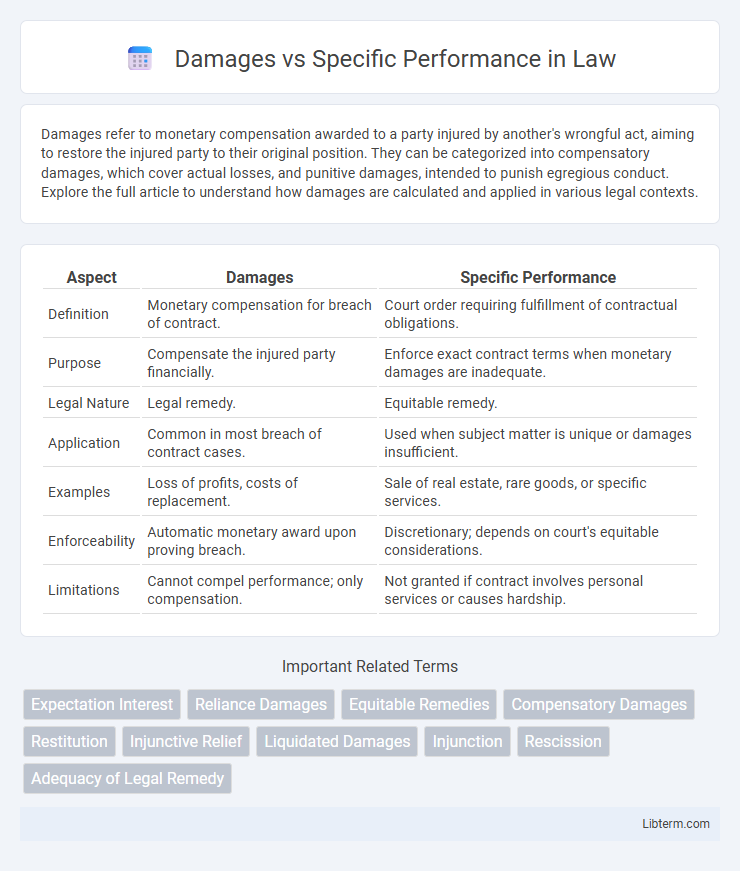Damages refer to monetary compensation awarded to a party injured by another's wrongful act, aiming to restore the injured party to their original position. They can be categorized into compensatory damages, which cover actual losses, and punitive damages, intended to punish egregious conduct. Explore the full article to understand how damages are calculated and applied in various legal contexts.
Table of Comparison
| Aspect | Damages | Specific Performance |
|---|---|---|
| Definition | Monetary compensation for breach of contract. | Court order requiring fulfillment of contractual obligations. |
| Purpose | Compensate the injured party financially. | Enforce exact contract terms when monetary damages are inadequate. |
| Legal Nature | Legal remedy. | Equitable remedy. |
| Application | Common in most breach of contract cases. | Used when subject matter is unique or damages insufficient. |
| Examples | Loss of profits, costs of replacement. | Sale of real estate, rare goods, or specific services. |
| Enforceability | Automatic monetary award upon proving breach. | Discretionary; depends on court's equitable considerations. |
| Limitations | Cannot compel performance; only compensation. | Not granted if contract involves personal services or causes hardship. |
Introduction to Contract Remedies
Contract remedies aim to address breaches by providing compensation or enforcement to protect contractual interests. Damages offer monetary compensation to cover losses incurred due to breach, emphasizing economic restitution. Specific performance compels parties to fulfill their contractual obligations, typically utilized when monetary damages are inadequate, such as in unique property or rare goods cases.
Understanding Damages in Contract Law
Damages in contract law serve as monetary compensation awarded to the injured party when a breach of contract occurs, aiming to restore them to the position they would have been in if the contract had been properly fulfilled. Compensatory damages, the most common type, cover direct losses and costs incurred due to the breach, while consequential damages address indirect and foreseeable losses. Understanding the scope and calculation of damages is essential for determining whether monetary compensation adequately remedies the harm or if specific performance, a court order requiring contract fulfillment, is necessary.
Types of Damages Awarded
Types of damages awarded in contract law include compensatory damages, which cover direct losses and costs incurred, and consequential damages, addressing indirect losses resulting from breach. Punitive damages, although rare in contract cases, intend to punish egregious behavior rather than compensate, while nominal damages recognize breach without significant financial loss. Specific performance is an equitable remedy compelling parties to fulfill contractual obligations when monetary damages are insufficient.
What is Specific Performance?
Specific performance is a legal remedy in contract law that compels a party to fulfill their contractual obligations as originally agreed, rather than simply paying monetary damages for breach. This remedy is typically granted when monetary compensation is inadequate, such as in cases involving unique goods, real estate transactions, or rare items. Courts enforce specific performance to ensure the aggrieved party receives the exact performance promised, preserving the contract's intended value.
Situations Favoring Damages as a Remedy
Damages are favored as a remedy in situations where monetary compensation can adequately address the harm caused by breach of contract, such as in cases involving easily quantifiable financial losses or readily available substitute goods. Courts prefer damages when enforcing specific performance would require continuous supervision or when the subject matter of the contract is not unique, making performance less critical. Additionally, when equity principles suggest that compelling performance would impose undue hardship or be impractical, damages provide a more efficient and just resolution.
Circumstances Requiring Specific Performance
Specific performance is typically required when damages are inadequate to remedy a breach of contract, particularly in cases involving unique goods or real estate where monetary compensation cannot substitute the actual performance. Circumstances necessitating specific performance include contracts for the sale of rare items, land transactions, or personal services with unique characteristics, making their precise fulfillment essential. Courts grant specific performance to enforce obligations that legal damages alone fail to address, ensuring equitable relief in breach of contract cases involving unique subject matter.
Legal Requirements for Specific Performance
Specific performance requires a valid contract with clear, definite terms and proof that monetary damages are inadequate to remedy the harm. The plaintiff must demonstrate the feasibility of enforcing the order and that the subject matter is unique, such as real estate or rare goods. Courts generally do not grant specific performance for personal service contracts or when continuous supervision would be necessary.
Comparing Damages and Specific Performance
Damages and specific performance are two primary remedies in contract law used to address breaches, with damages providing monetary compensation to the injured party while specific performance compels the breaching party to fulfill contractual obligations. Damages are preferred when monetary loss can be quantified and adequately compensated, whereas specific performance is typically reserved for transactions involving unique goods or property where monetary damages are insufficient. Courts are more likely to grant specific performance in cases involving real estate contracts or rare items, emphasizing the principle that not all breaches can be remedied by financial compensation alone.
Factors Influencing Court Decisions
Courts consider the adequacy of monetary damages, the feasibility of enforcing specific performance, and the uniqueness of the subject matter when deciding between damages and specific performance. The complexity of contract terms and the potential hardship to the parties also heavily influence judicial discretion. Legal precedent and public policy often guide courts to favor specific performance in real estate or rare goods cases, while damages are preferred for readily quantifiable losses.
Conclusion: Choosing the Right Remedy
Selecting between damages and specific performance depends on the nature of the breach and the uniqueness of the subject matter involved. Damages provide monetary compensation suitable for contracts involving fungible goods or services where loss can be quantified. Specific performance is preferable for unique assets like real estate or rare items where monetary compensation fails to make the injured party whole.
Damages Infographic

 libterm.com
libterm.com